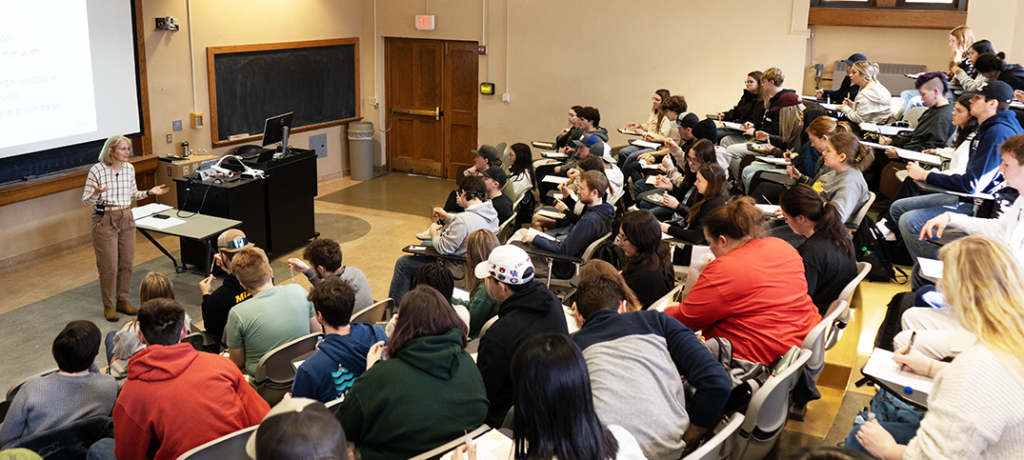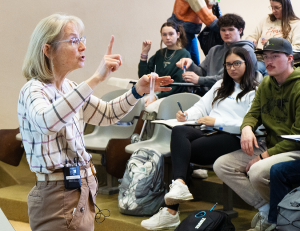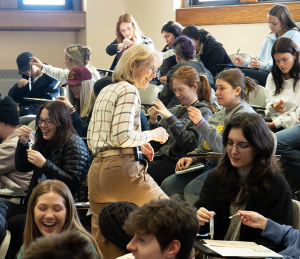Published on Jan. 29, 2024

While Shari Freyermuth had planned to one day attend medical school, when she arrived at the University of Georgia as an undergraduate student she found a new interest – research. That enthusiasm for discovery followed her as she finished her Ph.D. at Duke University and began a postdoctoral fellowship at the University of Missouri.
Freyermuth’s fellowship was in the laboratory of Joe Polacco, a professor emeritus of biochemistry at Mizzou. There, she participated in a variety of exciting plant-related projects and provided mentorship to the undergraduate students in the lab. It was the latter experience that made the biggest impression on Freyermuth. She thought a career as an educator could be a fulfilling one.
“I realized that I liked research, but I really liked my interactions with the undergraduates who were in the lab,” Freyermuth said. “I thought getting into teaching would be a rewarding experience. At the time, there was a need for biochemistry professors at MU. I went to Bill Folk, who was the chair at the time, with a simple proposal – he needed people to teach, and I wanted to teach. It was a perfect pairing. I was brought on as an instructor and got into advising soon thereafter.”

Nearly three decades later, hundreds of Mizzou students can attest that Freyermuth’s career choice was a stellar one.
Along with being an associate teaching professor of biochemistry, Freyermuth is an assistant dean in the MU College of Agriculture, Food and Natural Resources (CAFNR) Office of Academic Programs; the director of student services in the same office; and the director of undergraduate education and advising for biochemistry.
Freyermuth is also an affiliate faculty member in the Honors College, a role she has held for several years.
“There have always been a lot of biochemistry students who are also pursuing the Honors Certificate,” Freyermuth said. “So, I got involved pretty early on and opportunities continued to come, and my role continued to grow in different ways. They keep asking me to come back, and I keep saying yes. I’ve been very pleased the evolution of Honors over the years.”
Freyermuth, who will retire at the end of August, has a taught a variety of Honors courses throughout her time at Mizzou. She said one of her favorites actually happened last semester with the “Intro to STEM Research” course. Freyermuth was one of three professors to teach the class, which is designed to provide first and second year Honors students with an opportunity to prepare for future independent research experiences through the completion of a course-based undergraduate research experience.
“I’ve always loved teaching lab classes, and I was thrilled to participate in this new Honors course,” Freyermuth said. “We had students with a variety of research backgrounds, and I think we were able to provide them with good hands-on experiences that will hopefully aid them as they join labs across campus.

“I also really like that with this class there was no set answer at the end of a project. With a lot of labs, you have students do a procedure that has a definite answer. That was not the case with our work, which, I think, was an important lesson to learn. Science and research are like that. There’s not always a direct answer waiting for you at the end of your work. We wanted them to understand that early on.”
Freyermuth said she appreciates the support that the Honors College provides for students interested in research, through scholarships and unique programs. As part of her assistant dean role for CAFNR, Freyermuth helps place some of those students, primarily Discovery Fellows, with CAFNR faculty. Through the Discovery Fellows program, students gain insight into the professional world, enhance their knowledge base and critical thinking skills, and better prepare themselves for the future.
“Sometimes those placements work out great and sometimes they don’t work as well; it’s hard to glean what a student wants to actually do from an essay,” Freyermuth said. “However, with this new course, they can find what they do and don’t like, as well as where their strengths are. I think it’s a great class that is really going to help our students find success.”
Along with teaching and serving on several committees in Honors, Freyermuth has worked closely with the MedOpp Advising Office, which provides advising for pre-medical (allopathic and osteopathic), pre-dental, pre-optometry, pre-podiatry, pre-physician assistant, pre-physical therapy and pre-occupational therapy students at MU. She has helped with numerous evaluative interviews that students take part in to prepare for official interviews.
“MedOpp has grown and expanded so much, which is such a benefit to our students,” Freyermuth said. “They do vital work, and it’s a great recruitment tool, especially over here in biochemistry. I know the students and parents I talk with during visits are always impressed that Mizzou offers a team of advisors who are dedicated to aiding students in their medical pursuits.”
As Freyermuth heads toward her final months in the classroom, she said there are going to be numerous things she’ll miss about Mizzou – including her work with the Honors College.
“It’s been great to see the growth in the Honors College,” Freyermuth said. “Adding advisors, scholarships and courses, as well as other programs, has been incredible. All the colleges on campus are involved in some way, too, which is great for our students. The future is certainly bright.”